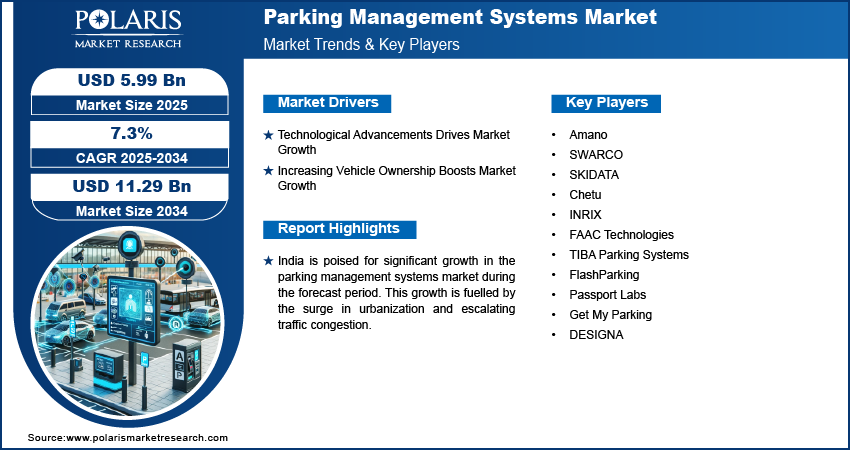The global Parking Management Systems Market is poised for significant growth, projected to expand from USD 5.99 billion in 2025 to USD 11.29 billion by 2034, registering a Compound Annual Growth Rate (CAGR) of 7.3% during the forecast period.
Market Overview
Parking Management Systems (PMS) encompass a suite of technologies and services designed to optimize parking space utilization, enhance traffic flow, and improve user experience. These systems integrate hardware components like sensors and cameras with software solutions for real-time monitoring, payment processing, and data analytics. The increasing urban population and the consequent rise in vehicle ownership have intensified the demand for efficient parking solutions, propelling the PMS market forward.
Key Market Growth Drivers
- Rapid Urbanization and Vehicle Ownership
The surge in urban populations has led to increased vehicle ownership, exacerbating parking challenges in metropolitan areas. Efficient parking management has become crucial to mitigate traffic congestion and reduce the environmental impact of idling vehicles searching for parking spots. Studies indicate that in the U.S., an average driver spends approximately 17 hours annually searching for parking, leading to significant time and fuel wastage.
- Smart City Initiatives and Technological Advancements
Governments worldwide are investing in smart city projects, integrating advanced technologies like the Internet of Things (IoT), Artificial Intelligence (AI), and cloud computing into urban infrastructure. These technologies enable real-time data collection and analysis, facilitating dynamic pricing, predictive analytics, and efficient resource allocation in parking management. For instance, the adoption of smart parking solutions in cities like Barcelona has significantly improved traffic flow and reduced emissions.
- Environmental Concerns and Sustainability Goals
With transportation being a major contributor to greenhouse gas emissions, efficient parking management plays a pivotal role in environmental conservation. By reducing the time vehicles spend idling while searching for parking, PMS contribute to lower fuel consumption and decreased emissions, aligning with global sustainability objectives.
- Integration of Contactless and Mobile Payment Systems
The shift towards digitalization has led to the widespread adoption of contactless and mobile payment solutions in parking management. These systems offer convenience to users and streamline operations for service providers, enhancing the overall efficiency and user experience of parking facilities.
Market Challenges
- High Implementation Costs
The deployment of advanced parking management systems involves significant capital investment in hardware, software, and infrastructure. This financial barrier can deter small municipalities and private operators from adopting these technologies, especially in developing regions.
- Data Privacy and Security Concerns
The integration of IoT and AI in parking management raises concerns regarding data privacy and cybersecurity. Ensuring the protection of user data and preventing unauthorized access to systems are critical challenges that need to be addressed to maintain public trust and system integrity.
- Regulatory and Standardization Issues
The lack of standardized regulations and protocols across different regions can hinder the interoperability and scalability of parking management systems. Establishing universal standards is essential to facilitate seamless integration and operation across various jurisdictions.
𝐄𝐱𝐩𝐥𝐨𝐫𝐞 𝐓𝐡𝐞 𝐂𝐨𝐦𝐩𝐥𝐞𝐭𝐞 𝐂𝐨𝐦𝐩𝐫𝐞𝐡𝐞𝐧𝐬𝐢𝐯𝐞 𝐑𝐞𝐩𝐨𝐫𝐭 𝐇𝐞𝐫𝐞 @ https://www.polarismarketresearch.com/industry-analysis/parking-management-systems-market
Key Market Players:
- Amano
- SWARCO
- SKIDATA
- Chetu
- INRIX
- FAAC Technologies
- TIBA Parking Systems
- FlashParking
- Passport Labs
- Get My Parking
- DESIGNA
Polaris Market Research has segmented the parking management systems report based on offerings, parking site, end users:
By Offerings Outlook (Revenue – USD billion, 2020–2034)
- Solutions
- Parking Guidance
- Parking Reservation Management
- Parking Permit Management
- Parking Enforcement Management
- Parking Access and Revenue Control System
- Parking Security and Surveillance
- Others Solutions
- Services
- Professional Service
- Consulting and Training
- Systems Integration and Deployment
- Support and Maintenance
- Managed Services
- Professional Service
By Parking Site Outlook (Revenue – USD billion, 2020–2034)
- On-Street Parking
- Off-Street Parking
- Garage Parking
- Lot Parking
By End Users Outlook (Revenue – USD billion, 2020–2034)
- Residential
- Commercial
- Industrial
- Others
Regional Analysis
North America
North America leads the global PMS market, driven by early adoption of advanced technologies and substantial investments in smart city infrastructure. The U.S. market alone was valued at USD 5.20 billion in 2024 and is projected to grow at a CAGR of 20.4% from 2025 to 2030.
Europe
Europe holds a significant market share, with countries like Germany, the UK, and France implementing comprehensive smart parking solutions. The region’s focus on sustainability and stringent environmental regulations further bolster the adoption of efficient parking management systems.
Asia-Pacific
The Asia-Pacific region is expected to witness the highest growth rate during the forecast period, fueled by rapid urbanization, increasing vehicle ownership, and government initiatives promoting smart city development. Countries like China and India are investing heavily in modernizing their urban infrastructure, presenting lucrative opportunities for PMS providers.
Latin America and Middle East & Africa
These regions are gradually embracing parking management technologies, driven by urban development and the need to alleviate traffic congestion. While still in nascent stages, the growing awareness and governmental support indicate a positive outlook for market expansion.
Conclusion
The Parking Management Systems Market is undergoing a transformative phase, driven by technological advancements, urbanization, and the global push towards sustainable urban mobility. While challenges such as high implementation costs and regulatory disparities persist, the integration of smart technologies and supportive government initiatives are expected to propel the market forward. Stakeholders across the spectrum must collaborate to develop standardized, secure, and cost-effective solutions that address the complex parking needs of modern cities.
More Trending Latest Reports By Polaris Market Research:
Digital Textile Printing Market

